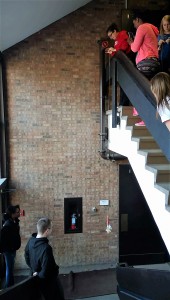One thing about Math Literacy that people don’t always think about: just changing the material or the emphasis doesn’t make it interesting. Yes, because of the team aspect and the content all being in context, my students are more engaged. But still, doing the same thing everyday, working math problems on paper all the time, becomes routine and boring. It’s really important to find hands-on activities to get them out of their seats.
 So, Barbie bungee jumping. I got the idea from an NCTM post. Tie linked rubber bands to Barbie’s feet. Do a few test runs with smaller amounts of rubber bands, create a line of best fit to model the drop distance, then use it to predict the number of rubber bands needed to drop Barbie from a second-story stair landing. The group that gets her closest to the floor without hitting her head wins. (Do post someone to warn passersby!)
So, Barbie bungee jumping. I got the idea from an NCTM post. Tie linked rubber bands to Barbie’s feet. Do a few test runs with smaller amounts of rubber bands, create a line of best fit to model the drop distance, then use it to predict the number of rubber bands needed to drop Barbie from a second-story stair landing. The group that gets her closest to the floor without hitting her head wins. (Do post someone to warn passersby!)
We did this the afternoon of the last day before spring break. Not usually a good day for student engagement, but mine had a great time and learned about linear regression
along the way!
